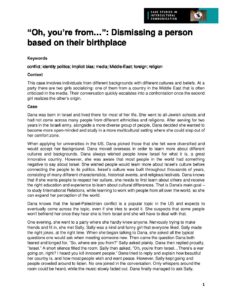“Oh, you’re from…”: Dismissing a person based on their birthplace
Keywords
conflict; identity politics; implicit bias; media; Middle-East; foreign; religion
Context
This case involves individuals from different national backgrounds with different cultures and beliefs. At a party there are two girls socializing – one of them from a country in the Middle East that is often criticized in the media. Their conversation quickly escalates into a confrontation once the second girl realizes the other’s origin.
Case
Dana was born in Israel and lived there for most of her life. She went to all-Jewish schools and did not come across many people from different ethnicities and religions. After serving for two years in the Israeli army, alongside a more diverse group of people, Dana decided she wanted to become more open-minded and study in a more multicultural setting where she could step out of her comfort zone.
When applying for universities in the United States, Dana picked those that she felt were diversified and would accept her background. Dana moved overseas in order to learn more about different cultures and backgrounds and always wished people knew Israel for what it is, a great innovative country. However, she was aware that most people in the world had something negative to say about Israel. She wished people would learn more about Israel’s culture before connecting the people to its politics. Israel’s culture was built throughout thousands of years, consisting of many different characteristics, historical events, and religious festivals. Dana knows that if she wants people to respect her culture, she needs to first learn about others by engaging in an education and experiences to learn about cultural differences. That is Dana’s main goal – to study international relations, while learning to work with people from all over the world, so she can expand her perception of the world.
Dana knows that the Israel-Palestinian conflict is a popular topic in the US and expects to eventually come across the topic, even if she tries to avoid it. She suspects that some people won’t befriend her once they hear she is from Israel and she will have to deal with that.
One evening, Dana went to a party where she hardly knew anyone. Nervously trying to make friends and fit in, she met Sally. Sally was a kind and funny girl that everyone liked. Sally made the right jokes, at the right time. When she began talking to Dana, she asked all the typical questions one would ask when meeting someone new. Then came the question Dana both feared and longed for, “So, where are you from?” Sally asked plainly. Dana then replied proudly, “Israel.” A short silence filled the room. Sally then asked, “Oh, you’re from Israel…There’s a war going on, right? I heard you kill innocent people.” Dana tried to reply and explain how beautiful her country is, and how most people wish and want peace. However, Sally kept talking and people crowded around to listen. No one joined in the conversation. Only whispers around the room could be heard while the music slowly faded out. Dana finally managed to ask Sally, “Where do you receive your information?” Rolling her eyes, Sally said, “Instagram, Twitter, and I watch the news sometimes, too.”
Sally’s social media is filled with pages of hate content against Israel, which presents a false image through a short-sighted lens. Not long ago, Sally saw one of Dua Lipa’s posts against Israeli soldiers and since then she has believed that all people in the Israeli army are soulless murderers. She has never looked more into the story and made up her mind after looking at a thirty-second Instagram story.
Dana decided not to continue the conversation since they were at a party and she didn’t want to create any tension. She went back to her dorm that night feeling very uncomfortable. As a result of this interaction, Dana feels that people at the party judged her because of her nationality and the way her country is poorly portrayed through the media.
Discussion Questions
As you consider this case, discuss:
- What kind of assumptions might individuals make about a person based on their country of origin?
- Why might someone automatically judge a person based on where they’re from?
- How would you approach someone whose beliefs contradict yours?
- How does social media affect our biases?
- What do you think Dana should have done at the party?
- If you were Sally, how would act differently?
- In what direction would the conversation had gone if someone stepped in to defend Dana?
- Would it help to speak to Sally after the party? What could Dana say to her to explain?
Additional Resources
Additional recommended resources to explore the central themes in this case are available.
- Guided Mind. (0AD). 5 Steps to Deal with Confrontational People. Guided Mind. https://www.guidedmind.com/blog/5-steps-to-deal-with-confrontational-people.
- Makarova, E. L. (2014). Culturally-Based and Culturally-Biased Aspects of Knowing the Other. Horizon Research Publishing.
- Skillsyouneed.com. (0AD). Improving Communication: Developing Effective Communication Skills. SkillsYouNeed. https://www.skillsyouneed.com/ips/improving-communication.html.
- United Nations. (0AD). Rise in antisemitism during pandemic shows we can never let down our guard: UN chief | | UN News. United Nations. https://news.un.org/en/story/2021/01/1082872.
- YouTube. (2018). What does it mean to be an Israeli? YouTube. https://www.youtube.com/watch?v=RVwsV7L-WeQ&feature=youtu.be.
Corresponding Author
Listenberg, Tamara Frida. American University, Washington, DC, USA. Email: tl8525a@student.american.edu


